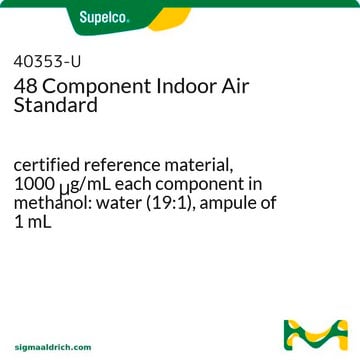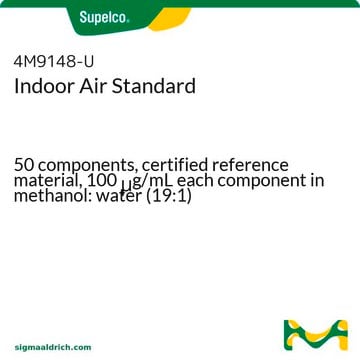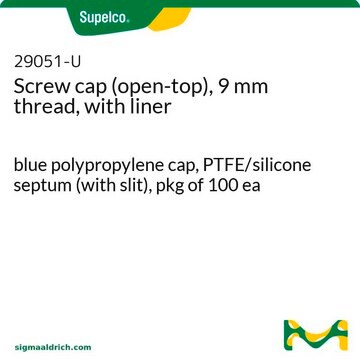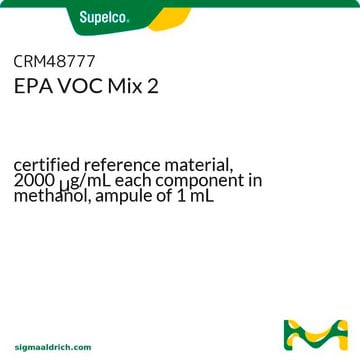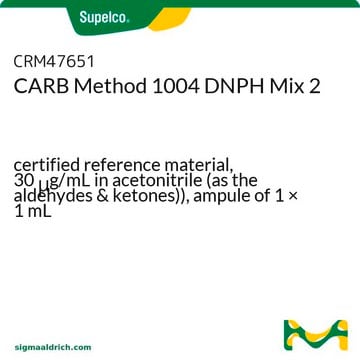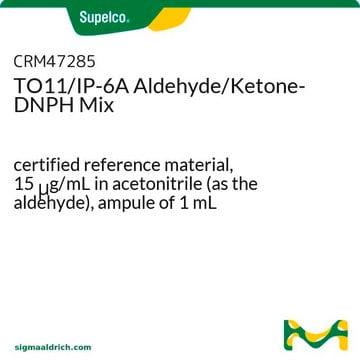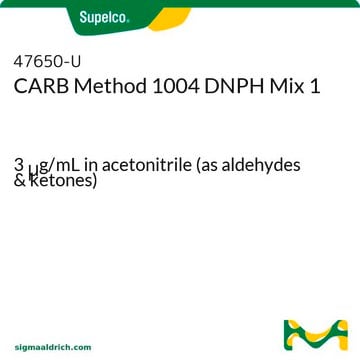49148-U
Indoor Air Standard
50 components, certified reference material, 100 μg/mL each component in methanol: water (19:1)
Synonym(s):
Indoor Air Quality Standard
About This Item
Recommended Products
grade
certified reference material
TraceCERT®
Quality Level
product line
TraceCERT®
CofA
current certificate can be downloaded
packaging
ampule of 1 mL
concentration
100 μg/mL each component in methanol: water (19:1)
technique(s)
gas chromatography (GC): suitable
format
multi-component solution
storage temp.
-10 to -25°C
Looking for similar products? Visit Product Comparison Guide
Application
- Indoor Environmental Quality in Educational Settings: A comparative study evaluated the impact of standard versus advanced air quality solutions in schools, demonstrating the significance of superior indoor environmental controls for enhancing learning outcomes and health in educational environments (Volf et al., 2023).
- Advanced Air Quality Monitoring in Underground Spaces: This review details the design factors that affect indoor environmental quality in underground spaces, focusing on their implications for users′ health, which is crucial for the development of sustainable urban spaces and can be applied to ensure safety in biotechnological facilities (Baek et al., 2024).
- Indoor Air Quality in Sports Facilities During Pandemics: An examination of indoor air quality and ventilation standards in sports facilities during health crises, this study provides insights into the application of air quality standards to maintain safe and functional environments in high-activity indoor settings (Zhang et al., 2023).
- Exposure and Biomonitoring of PAHs in Urban Indoor Environments: This research investigates the levels and factors affecting polycyclic aromatic hydrocarbon (PAH) exposure in residential indoor air, offering essential data for improving air quality controls in urban settings, particularly in pharmaceutical and biotechnological research environments (Soleimani et al., 2024).
Other Notes
Legal Information
Analyte
Signal Word
Danger
Hazard Statements
Precautionary Statements
Hazard Classifications
Acute Tox. 3 Dermal - Acute Tox. 3 Inhalation - Acute Tox. 3 Oral - Flam. Liq. 3 - STOT SE 1
Target Organs
Eyes,Central nervous system
WGK
WGK 2
Flash Point(F)
122.0 °F
Flash Point(C)
50 °C
Choose from one of the most recent versions:
Already Own This Product?
Find documentation for the products that you have recently purchased in the Document Library.
Customers Also Viewed
Our team of scientists has experience in all areas of research including Life Science, Material Science, Chemical Synthesis, Chromatography, Analytical and many others.
Contact Technical Service